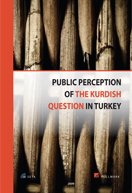I get this question all the time: how does Turkey do it? In international relations, Turkey wants to be a member of the European Union, continue its partnership with the US, have good relations with Russia and Iran, be fully involved in Iraq and the larger Middle East, increase its presence in the Balkans and central Asia and open up to Africa and Latin America. Domestically, Turkey wants to strengthen its democracy, improve its human rights record, continue its economic development, find a solution to the Kurdish problem and ease the tensions between religion and the Turkish state.
For those who still live in the imaginary world of some eternal principles, it is impossible to do all these things at the same time. The either/or dichotomy has too long crippled the Turkish state from engaging in multiple initiatives. The state has opted for one thing and seen everything else as impossible options. If Turkey were to become a member of the Western club during the Cold War, this meant having practically no relations with the Middle East. If Turkey were to protect its secularism, this meant giving very little room to democracy. If the state were to be protected at all costs, that meant limiting the development of civil society. The list goes on.
The realities of the 21st century, however, force Turkey to go beyond such old dichotomies. Turkish society, the business community, professionals and the media are all engaged in multiple worlds with connections beyond the borders of Turkey and the region. Closing oneself off no longer provides security. To the contrary, countries need to open up and form new alliances to ensure the safety and security of their citizens. This means that there is no contradiction between maintaining our good relationship with the US and improving our economic relations with Russia. (Well, Turkey needs Russian and Iranian gas anyway.)
The same applies to security concerns in the region. What happens in Iraq, Lebanon and Palestine has a direct impact on regional security, which in turn affects Turkey and its security concerns. Turkey's war against Kurdistan Workers' Party (PKK) terrorism is a case in point. Some PKK forces are now using the Kandil Mountains in northern Iraq to launch attacks against Turkish targets. This strains, to say the least, Turkey's relations with northern Iraqi Kurds and the US. But it also raises questions about the threat of terrorism in the region as a whole and the failure of the US and other countries to contain and stop it. This is where Turkey seeks to get such actors as Iran, Syria, Hamas and Hezbollah to be part of the process whereby regional security and stability is established through the participation of all stakeholders involved. (And this is where we part ways with the US.)
Domestically Turkey is embracing multiple identities: Muslim, Turkish, Kurdish, non-Muslim, democratic, secular, religious, Sunni, Alevi, modern, Eastern and Western. The attempts by the Turkish state to create and assign only one type of identity to all of its citizens have long failed and led to the marginalization of very large segments of Turkish society. What was once seen as threat to national unity and security (i.e., religious and ethnic pluralism) is now seen as an asset.
This is part of a larger transformation Turkey and the world are undergoing. We have come a long way from the rigid and one-dimensional identity claims of the Cold War era. In the wake of 19th century colonialism and later in the 1950s and '60s, most identities were based on binary oppositions -- you were either with the communists or with the West; you were either a staunch Turkish nationalist or a traitor; you were either a believer or infidel, etc.
Such rigid categories no longer explain the subtleties and complexities of our day and age. Multiple and multi-tiered identities underlie people's individual choices, aspirations, dreams and collective associations. Like the rest of the world, Turkey is moving in a direction that reflects the realities of power sharin









